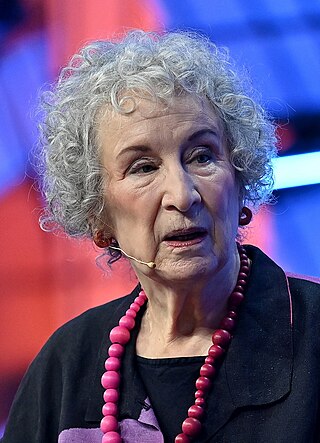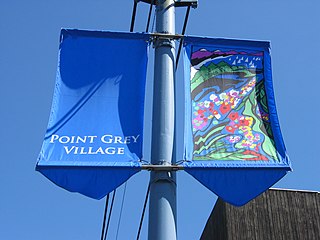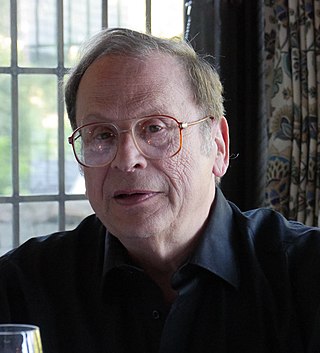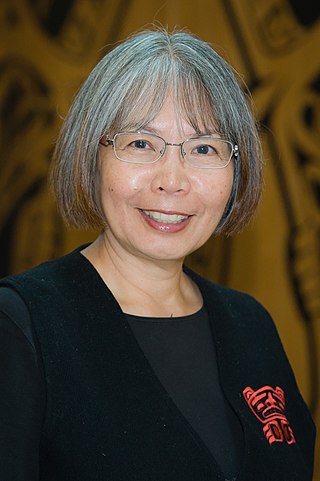Related Research Articles
Eh is a spoken interjection used in many varieties of English. The oldest Oxford English Dictionary defines eh as an "interjectional interrogative particle often inviting assent to the sentiment expressed." Today, while eh has many different uses, it is most popularly used in a manner similar in meaning to "Excuse me?", "Please repeat that", "Huh?", or to otherwise mark a question. It is also commonly used as an alternative to the question tag "right?", as a method for inciting a reply, as in "Don't you think?", "You agree with me, right?", as in, "It's nice here, eh?". In the Americas, it is most commonly associated with Canada and Canadian English, though it is also common in England, Scotland, and New Zealand. It is also known in some American regions bordering Canada, including the area stretching from northern Wisconsin up to Michigan's Upper Peninsula. Similar interjections exist in many other languages, such as Azerbaijani and Italian and Dutch.

Margaret Eleanor Atwood is a Canadian novelist, poet, and literary critic. Since 1961, she has published 18 books of poetry, 18 novels, 11 books of nonfiction, nine collections of short fiction, eight children's books, two graphic novels, and a number of small press editions of both poetry and fiction. Her best-known work is the 1985 dystopian novel The Handmaid's Tale. Atwood has won numerous awards and honors for her writing, including two Booker Prizes, the Arthur C. Clarke Award, the Governor General's Award, the Franz Kafka Prize, Princess of Asturias Awards, and the National Book Critics and PEN Center USA Lifetime Achievement Awards. A number of her works have been adapted for film and television.
Canadian literature is written in several languages including English, French, and to some degree various Indigenous languages. It is often divided into French- and English-language literatures, which are rooted in the literary traditions of France and Britain, respectively. The earliest Canadian narratives were of travel and exploration.

Canuck is a slang term for a Canadian, though its semantic nuances are manifold. Older sources often claimed the origins of the word as uncertain, or related to the Iroquoian word for village (kanata), or other folk linguistic etymologies. Historical linguists consider it as "highly plausible" today that Canuck derives from the influx of Hawaiian migrants in the late 18th and early 19th centuries, the Polynesian Kanaka people, in what would as of 1858 become British Columbia. The term Kanuck is first recorded in 1835 as an Americanism, originally referring to Dutch Canadians or French Canadians. By the 1850s, the spelling with a "C" became predominant. Today, many Canadians and others use Canuck as a mostly affectionate term for any Canadian.

Emily Pauline Johnson, also known by her Mohawk stage name Tekahionwake, was a Canadian poet, author, and performer who was popular in the late 19th and early 20th centuries. Her father was a hereditary Mohawk chief, and her mother was an English immigrant.

Gwendolyn Margaret MacEwen was a Canadian poet and novelist. A "sophisticated, wide-ranging and thoughtful writer," she published more than 20 books in her life. "A sense of magic and mystery from her own interests in the Gnostics, Ancient Egypt and magic itself, and from her wonderment at life and death, makes her writing unique.... She's still regarded by most as one of the best Canadian poets."

Alias Grace is a historical fiction novel by Canadian writer Margaret Atwood. First published in 1996 by McClelland & Stewart, it won the Canadian Giller Prize and was shortlisted for the Booker Prize.
The Faculty of Arts and Sciences is the largest of all faculties at Queen's University at Kingston, and one of the original three faculties that founded the school in 1841.

West Point Grey is a neighbourhood in the northwest of the city of Vancouver, British Columbia, Canada. It is on Point Grey and bordered by 16th Avenue to the south, Alma Street to the east, English Bay to the north, and Blanca Street to the west. Notable beaches within West Point Grey include Spanish Banks, Locarno and Jericho. Immediately to the south is Pacific Spirit Regional Park and to the east is Kitsilano.

Survival: A Thematic Guide to Canadian Literature is a survey of Canadian literature by Margaret Atwood, one of the best-known Canadian authors. It was first published by House of Anansi in 1972.

Keith Maillard is an American Canadian novelist, poet, and professor of creative writing at the University of British Columbia. He moved to Canada in 1970 and became a Canadian citizen in 1976.
Canadian Literature is a quarterly peer-reviewed journal of criticism and review, founded in 1959 and owned by the University of British Columbia. The journal publishes articles of criticism and reviews about Canadian literature in English and French by Canadian and international scholars. It also publishes around 24 original poems a year and occasional interviews with writers. Each issue contains an extensive book reviews section. Rather than focusing on a single theoretical approach, Canadian Literature contains articles on all subjects relating to writers and writing in Canada. Each issue contains content from a range of contributors, and the journal has been described as "critically eclectic".
A Dictionary of Canadianisms on Historical Principles (DCHP) is a historical usage dictionary of words, expressions, or meanings which are native to Canada or which are distinctively characteristic of Canadian English though not necessarily exclusive to Canada. The first edition was published by W. J. Gage Limited in 1967. The text of this first edition was scanned and released as a free-access online dictionary in 2013.
Veronica Jane Strong-Boag is a Canadian historian specializing in the history of women and children in Canada. She is a Professor Emerita at the University of British Columbia, where she was Professor of Women's History and the founding Director of the Centre for Women’s and Gender Studies.
Reingard Monika Nischik is a retired German university professor and literary scholar.
Margaret Beryl Clunies Ross is a medievalist who was until her retirement in 2009 the McCaughey Professor of English Language and Early English Literature and Director of the Centre for Medieval Studies at the University of Sydney. Her main research areas are Old Norse-Icelandic Studies and the history of their study. Since 1997 she has led the project of editing a new edition of the corpus of skaldic poetry. She has also written articles on Australian Aboriginal rituals and contributed to the Oxford Dictionary of National Biography.

Jo-Ann Archibald, also known as Q’um Q’um Xiiem, is an Indigenous studies scholar from the Sto:lo First Nation in British Columbia, Canada.
Barbara Anne Croy is a Canadian reproductive immunologist and professor emerita in Biomedical and Molecular Sciences at Queen's University. From 2004 until 2016, Croy was a Canada Research Chair in Reproduction, Development and Sexual Function. In 2017, she was elected a Fellow of the Royal Society of Canada. Her research focus is on mice pregnancy and natural killer cells.

Lennie Goodings is a Canadian-born publisher active in the United Kingdom. She is Chair of the UK British publishing house Virago Press.
Deanna Helen Reder is a Cree-Métis associate professor of English and the Chair of Indigenous Studies at Simon Fraser University. Reder was elected a member of the College of New Scholars of the Royal Society of Canada in 2018. As a faculty member at Simon Fraser University, she was a founding member of the Indigenous Literary Studies Association (ILSA) and served on the council from 2015 to 2018. In 2019 she helped establish the Indigenous Editors Association (IEA) and served as its "Past-President" from 2020 to 2021.
References
- 1 2 3 4 "Margery Fee Announced as Mclean Chair, 2015-2017". canadianstudies.ubc.ca. 26 February 2015. Archived from the original on 10 July 2015. Retrieved 23 April 2019.
- ↑ "Resolve a Handle and View the Values". hdl.handle.net. Retrieved 29 September 2023.
- 1 2 3 "Dr. Margery Fee: Fostering Student Engagement" . Retrieved 23 April 2019.
- 1 2 Margery Fee (16 March 2011). "Academic Accidents and the Development of Usage Guide". queensu.ca. Retrieved 24 April 2019.
- ↑ "Home | Strathy Language Unit".
- ↑ "Case 8: The Strathy Language Unit and Canadian English". virtual-exhibits.library.queensu.ca. 7 July 2015. Retrieved 24 April 2019.
- ↑ "Strathy Corpus of Canadian English | Strathy Language Unit". www.queensu.ca. Retrieved 23 June 2020.
- ↑ "English-Corpora: Strathy". www.english-corpora.org. Retrieved 23 June 2020.
- ↑ "Strathy Language Unit – Queen's University 1981 – 2011". queensu.ca. Retrieved 24 April 2019.
- ↑ "Silence Made Visible: Howard O'Hagan and Tay John". ecwpress.com. Retrieved 24 April 2019.
- ↑ Margery Fee, ed. Silence Made Visible: Howard O'Hagan and Tay John (ECW Press, 1992), 21-38.
- ↑ "The Fat Lady Dances: Margaret Atwood's Lady Oracle". umanitoba.ca. September 1994. Retrieved 24 April 2019.
- 1 2 "Margery Fee". pwias.ubc.ca. Retrieved 23 April 2019.
- ↑ "Awards & Honours". english.ubc.ca. Retrieved 23 April 2019.
- ↑ "Margery Fee, Lucie Hotte, and Lorraine York named Fellows of the Royal Society of Canada". canlit.ca. 7 September 2017. Retrieved 24 April 2019.
- ↑ "CanLit Guides Editorial Team | CanLit Guides". canlitguides.ca. Retrieved 23 June 2020.
- ↑ "Gabrielle Roy Prize Finalist". english.ubc.ca. Retrieved 23 April 2019.
- ↑ Literary Land Claims . Retrieved 24 April 2019.
{{cite book}}:|website=ignored (help) - ↑ "The Promise of Paradise: Reading, Researching, and Using the Private Library — Jun 17-18, 2016". spokenweb.ca. Retrieved 24 April 2019.
- ↑ "About the Project". thepeopleandthetext.ca. Retrieved 24 April 2019.
- ↑ "Tekahionwake : E. Pauline Johnson's writings on native North America / edited by Margery Fee and Dory Nason". trove.nla.gov.au. Retrieved 24 April 2019.
- ↑ "Margery Fee, fellow to the Royal Society of Canada". canadianstudies.ubc.ca. Retrieved 23 April 2019.
- ↑ "Fellows | the Royal Society of Canada". 3 August 2012.
- ↑ "au: Fee, Margery". worldcat.org. Retrieved 23 April 2019.